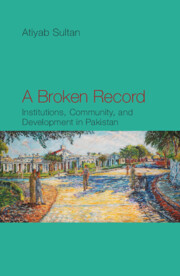Book contents
- Frontmatter
- Contents
- List of Figures
- List of Tables
- Preface
- Acknowledgements
- Introduction: Institutions, Debt, and the Deadweight of History, Punjab c. 1900–47
- 1 Glass Half Full?: Two Views of the Punjab
- 2 An Alternative Economic History of the Punjab
- 3 Combating Indebtedness I: Laws and Institutions
- 4 Combating Indebtedness II: Community Development in Colonial Punjab
- 5 The Bureaucrat’s Burden: Tales of Reform and Development
- 6 Colonialism and the Discourse on Development
- Postscript
- Glossary
- Bibliography
- Index
5 - The Bureaucrat’s Burden: Tales of Reform and Development
Published online by Cambridge University Press: 27 September 2022
- Frontmatter
- Contents
- List of Figures
- List of Tables
- Preface
- Acknowledgements
- Introduction: Institutions, Debt, and the Deadweight of History, Punjab c. 1900–47
- 1 Glass Half Full?: Two Views of the Punjab
- 2 An Alternative Economic History of the Punjab
- 3 Combating Indebtedness I: Laws and Institutions
- 4 Combating Indebtedness II: Community Development in Colonial Punjab
- 5 The Bureaucrat’s Burden: Tales of Reform and Development
- 6 Colonialism and the Discourse on Development
- Postscript
- Glossary
- Bibliography
- Index
Summary
Take up the White Man's burden–
Send forth the best ye breed–
Go bind your sons to exile,
To serve your captives’ need;
To wait in heavy harness,
On fluttered folk and wild–
Your new-caught sullen peoples,
Half devil and half child
—Rudyard Kipling, The White Man's BurdenIn February 1940, Sir Malcolm Darling, former Financial Commissioner of the Punjab and an expert on rural indebtedness in the province, delivered the presidential address at the first conference of the Indian Society of Agricultural Economics. Instead of a self-congratulatory speech on the many macro-level achievements of the imperial state in the Punjab (including the establishment of canal colonies, the construction of a vast railway network, and a phenomenal increase in agricultural output), Darling discussed the Punjabi peasant and the primacy that must be accorded to the individual in any sustained strategy of development:
I have always been more interested in men than in things, in values than in value, in welfare than in wealth. Nor have I so much concerned myself with the way men should live as with the way they do live. Life is infinitely complex and even for oneself it is not always easy to say what is good and what is bad. I therefore feel a certain diffidence in prescribing for others, and in dealing with the peasant, my chief study, my object has been less to apply a spur than to hold up a mirror in which he might perhaps see his life as it is and judge for himself how far it should be changed. Finally I have always sought contact with the individual rather than with the mass; the individual is more human and understandable, and ultimately the problem of human life is the problem of the individual.
Darling's views on the Punjab peasant emerged from over 40 years of close study of rural life in the province, including numerous tours on horseback during which he had interlocutors from all walks of life. His book The Punjab Peasant in Prosperity and Debt, first published in 1925, remains a seminal account of indebtedness, replete with statistical data and ethnography of village life.
- Type
- Chapter
- Information
- A Broken RecordInstitutions, Community and Development in Pakistan, pp. 108 - 157Publisher: Cambridge University PressPrint publication year: 2022



